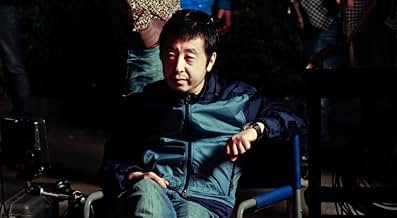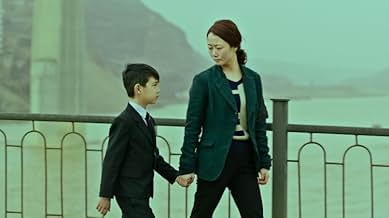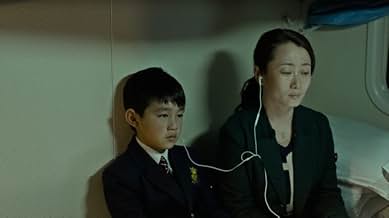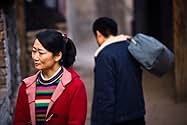CALIFICACIÓN DE IMDb
6.9/10
6.7 k
TU CALIFICACIÓN
Agrega una trama en tu idiomaThe life of Tao, and those close to her, is explored in three different time periods: 1999, 2014, and 2025.The life of Tao, and those close to her, is explored in three different time periods: 1999, 2014, and 2025.The life of Tao, and those close to her, is explored in three different time periods: 1999, 2014, and 2025.
- Dirección
- Guionista
- Elenco
- Premios
- 26 premios ganados y 42 nominaciones en total
Yi Zhang
- Zhang Jinsheng
- (as Zhang Yi)
Zijian Dong
- Zhang Daole aka Dollar
- (as Dong Zijian)
- Dirección
- Guionista
- Todo el elenco y el equipo
- Producción, taquilla y más en IMDbPro
Opiniones destacadas
Reading the reviews, you might suspect this to be a sophisticated, political film. You couldn't be more wrong: there's nothing sophisticated about it, it's about a heart that breaks over time.
The story follows a woman, and two men from different social status (a mine worker and a director), who both love her. Eventually she has to decide for one of them, but as time goes by, she wonders whether she made the right choice or not. Told over a time span of 25 years, the film shows like few others how time changes our society, affects the private lives of individuals. Especially the last part set in 2025 is masterfully done, it could have turned out sophisticated, instead it hits right into the heart.
The film says that things like social status and language do change our daily lives, and those changes can never be undone again.
The usage of the movie format is genius (even more then in Xavier Dolan's 'Mommy'), it tells us, that even though the future broadens our perspective, it also makes us lose focus of what is truly essential to live a happy life.
I have watched a ton of great movies in my life. This one takes the cake for most heartbreaking ending of all time. There are no words to describe it.
The story follows a woman, and two men from different social status (a mine worker and a director), who both love her. Eventually she has to decide for one of them, but as time goes by, she wonders whether she made the right choice or not. Told over a time span of 25 years, the film shows like few others how time changes our society, affects the private lives of individuals. Especially the last part set in 2025 is masterfully done, it could have turned out sophisticated, instead it hits right into the heart.
The film says that things like social status and language do change our daily lives, and those changes can never be undone again.
The usage of the movie format is genius (even more then in Xavier Dolan's 'Mommy'), it tells us, that even though the future broadens our perspective, it also makes us lose focus of what is truly essential to live a happy life.
I have watched a ton of great movies in my life. This one takes the cake for most heartbreaking ending of all time. There are no words to describe it.
Mountains May Depart, directed by Zhangke Jia, is a very fine Chinese drama, whose timeline spans some twenty-five years from the past, to the present, to the future, representing China in the modern age and possibly where it's headed. It is something that's quite unique and interesting. Jia was also the director of a movie I saw a few years ago called A Touch of Sin, and while I remember admiring that film (which is of a considerably darker subject matter than this one), it left me feeling a little cold, while I enjoyed the experience of Mountains May Depart more.
The main character in story, who is connected in one way or another to almost every other prominent person, is a woman named Tao Zhao, played by Shen Tao. She is the heart of the film even during much of the parts she's not in, playing it with empathy and truth in her journey, a very fine performance. There are two other good performances by Yi Zhang and Jing Dong Liang, and these three main character evolve significantly through time. But the main strength is a story dealing themes of class and materialism, and the cost of progress, put together in a way worthy of these universal human subjects.
Mountains does have some issues in the final of the three acts as it becomes a little odd--odd in a way that that might have worked with different material, but doesn't quite fit with the rest of this film. Still, this is an overall fascinating and moving experience, well-acted and written, making itself very relatable and is an impressive way to view these people over time.
The main character in story, who is connected in one way or another to almost every other prominent person, is a woman named Tao Zhao, played by Shen Tao. She is the heart of the film even during much of the parts she's not in, playing it with empathy and truth in her journey, a very fine performance. There are two other good performances by Yi Zhang and Jing Dong Liang, and these three main character evolve significantly through time. But the main strength is a story dealing themes of class and materialism, and the cost of progress, put together in a way worthy of these universal human subjects.
Mountains does have some issues in the final of the three acts as it becomes a little odd--odd in a way that that might have worked with different material, but doesn't quite fit with the rest of this film. Still, this is an overall fascinating and moving experience, well-acted and written, making itself very relatable and is an impressive way to view these people over time.
Jia Zhangke is a prominent figure in contemporary world cinema as one of the leading directors of the so-called sixth generation of Chinese filmmakers. He has become known for his personal films which discuss social transition in modern China through the experience of the individual. Zhangke's latest film "Mountains May Depart" (2015) continues this in an essential, if not exactly surprising, fashion. Like "A Touch of Sin" (2013) and "Still Life" (2006), the film has an episodic structure, but narrative is much more conventional and straight-forward. While there is a lot of change in narrative focalization, "Mountains May Depart" is strongly structured around the protagonist Tao, played by the director's muse Tao Zhao, whose life unfolds before us in three distinct periods: 1999, 2014, and 2025. Thus Zhangke takes a look behind, reflects on the present, and anticipates the future of the Chinese society.
As a social film, "Mountains May Depart" studies the individual in the grip of a changing world. It tackles the difficulty of communication to the extent where parents need interpreters to talk to their children. Globalization, capitalism, and the new freedom of the 21st century do not offer comfort or help, but rather appear as rootlessness, alienation, and solitude in the lives of people.
All of Zhangke's films are, more or less, about change, but in "Mountains May Depart" this theme manifests itself clearly on the level of style and narrative. Zhangke's narrative includes a modernist combination of perspectives, creating a simple complexity which is never disorienting, as different characters are followed throughout the film, enhancing a pluralist sense of multitude and change. While Zhangke's style has been known as consisting of long takes and complex camera movement, "Mountains May Depart" presents a greater variety in style. Zhangke's camera keeps a short distance to the characters, mainly on the level of the medium shot, but there are also memorable establishing extreme long shots which highlight the minuteness of the individual in a vast landscape. The camera does move a lot, though perhaps subtly, but the editing rhythm is not strikingly slow. One of the most conspicuous stylistic elements of the film is the changing aspect ratio. The first episode is shot in the letterbox 4:3 ratio, the second in the contemporary standard 16:9, and the last in the widescreen format 2.35:1. This constant widening of the aspect ratio of the image reflects not only the globalization of the Chinese society and the characters moving outside of their homeland but also a more primordial experience of change that is constant in human existence. It embraces the Heraclitean flux.
Thus Zhangke poeticizes the experience of change in a cinematic fashion; that is to say, he utilizes cinematic means to articulate a profound, existential experience of change. This he does by combining features that change (the aspect ratio, the focalizing perspective) with perpetual elements such as recurring songs ("Go West" by Pet Shop Boys), dramatic motifs (the dog, the keys), and the intimate cinematography. Like the characters, Zhangke's style and narrative seem to be searching for a red line, something that gives meaning and coherence in a world of change.
While "Mountains May Depart" might feel like a minor work in Zhange's oeuvre, it does redeem itself for a patient spectator. Like Zhangke's other films, it too looks at the contemporary Chinese society, the inevitable transition from the perspective of the individual, and modern identity in an ever-changing world. Although there certainly is sadness to all this, Zhangke's film is also quite optimistic and bright in comparison to his previous, darker film "A Touch of Sin". Mountains may depart -- the very borders of the image may broaden -- but something will endure. It is, in fact, as if higher levels of discourse were trying to find unity amidst variety: something that remains in the perpetual flux of change.
As a social film, "Mountains May Depart" studies the individual in the grip of a changing world. It tackles the difficulty of communication to the extent where parents need interpreters to talk to their children. Globalization, capitalism, and the new freedom of the 21st century do not offer comfort or help, but rather appear as rootlessness, alienation, and solitude in the lives of people.
All of Zhangke's films are, more or less, about change, but in "Mountains May Depart" this theme manifests itself clearly on the level of style and narrative. Zhangke's narrative includes a modernist combination of perspectives, creating a simple complexity which is never disorienting, as different characters are followed throughout the film, enhancing a pluralist sense of multitude and change. While Zhangke's style has been known as consisting of long takes and complex camera movement, "Mountains May Depart" presents a greater variety in style. Zhangke's camera keeps a short distance to the characters, mainly on the level of the medium shot, but there are also memorable establishing extreme long shots which highlight the minuteness of the individual in a vast landscape. The camera does move a lot, though perhaps subtly, but the editing rhythm is not strikingly slow. One of the most conspicuous stylistic elements of the film is the changing aspect ratio. The first episode is shot in the letterbox 4:3 ratio, the second in the contemporary standard 16:9, and the last in the widescreen format 2.35:1. This constant widening of the aspect ratio of the image reflects not only the globalization of the Chinese society and the characters moving outside of their homeland but also a more primordial experience of change that is constant in human existence. It embraces the Heraclitean flux.
Thus Zhangke poeticizes the experience of change in a cinematic fashion; that is to say, he utilizes cinematic means to articulate a profound, existential experience of change. This he does by combining features that change (the aspect ratio, the focalizing perspective) with perpetual elements such as recurring songs ("Go West" by Pet Shop Boys), dramatic motifs (the dog, the keys), and the intimate cinematography. Like the characters, Zhangke's style and narrative seem to be searching for a red line, something that gives meaning and coherence in a world of change.
While "Mountains May Depart" might feel like a minor work in Zhange's oeuvre, it does redeem itself for a patient spectator. Like Zhangke's other films, it too looks at the contemporary Chinese society, the inevitable transition from the perspective of the individual, and modern identity in an ever-changing world. Although there certainly is sadness to all this, Zhangke's film is also quite optimistic and bright in comparison to his previous, darker film "A Touch of Sin". Mountains may depart -- the very borders of the image may broaden -- but something will endure. It is, in fact, as if higher levels of discourse were trying to find unity amidst variety: something that remains in the perpetual flux of change.
Director Zhangke Jia is not afraid to tackle the problems of modern China, and 'Mountains May Depart' is no exception. The film touches upon issues such as growing inequality, poor working conditions and corruption, but the central theme is the price the country is prepared to pay for its obsession with material progress.
The film is set in Fenyang, a northern coal mining city and the director's hometown. In 1999, at the eve of the new millennium, eighteen year old Tao (played by the director's wife Tao Zhao) has to choose between two suitors: the honest but ordinary coal miner Liangzi and the flashy bragger Zhang. She sees right through Zhang's bravado, but can't resist the promise of a better life, symbolized by his red Volkswagen, 'perfect for the next century'. Liangzi feels humiliated and leaves town.
Fifteen years later, Tao is well-off, but divorced and unhappy. Her seven year old son is living the good life with his father in Shanghai. Liangzi, in the mean time, is terribly ill and returns to Fenyang. Filled with remorse, Tao helps him financially but doesn't seem to be able to relate to him on an emotional basis.
Flash-forward another ten years into the future, and Tao's son is living with his father in Australia. He had to leave China, it turns out, because of anti-corruption campaigns. The boy is a spoilt and clueless brat, who refuses to speak Chinese to his father, but finds some emotional warmth with his Chinese teacher.
The first two parts of the film are excellent. Tao's moral choices, the contrast between progress and tradition, the power of money - it's all shown in a beautiful heartfelt way. The director anchors the story with recurring images, like a tall pagoda on the banks of the Yellow River, and spices it with small symbolic items like dumplings and keys. An interesting feature is the changing aspect ratio: in the first episode the screen is almost square, and it widens until it is widescreen in the last episode. Another feature is the way dialogues are filmed: repeatedly the director frames only one participant. And a third peculiarity are some high-impact scenes without a clear meaning or function in the story: a crashing military plane, a coal truck losing some of its cargo, a nervous caged tiger.
The sad thing about this movie is that the third part is very different from the first two parts, and lacks the quality of it. Not only are we introduced to different protagonists, also in this part the dialogue and acting are clumsy and unnatural, the story lacks focus and the scenes seem pointless. It's as if the director loses his golden touch when the story leaves China.
Still, in this last episode, the message is hammered home: the strive for material wealth leads to emotional poverty.
The film is set in Fenyang, a northern coal mining city and the director's hometown. In 1999, at the eve of the new millennium, eighteen year old Tao (played by the director's wife Tao Zhao) has to choose between two suitors: the honest but ordinary coal miner Liangzi and the flashy bragger Zhang. She sees right through Zhang's bravado, but can't resist the promise of a better life, symbolized by his red Volkswagen, 'perfect for the next century'. Liangzi feels humiliated and leaves town.
Fifteen years later, Tao is well-off, but divorced and unhappy. Her seven year old son is living the good life with his father in Shanghai. Liangzi, in the mean time, is terribly ill and returns to Fenyang. Filled with remorse, Tao helps him financially but doesn't seem to be able to relate to him on an emotional basis.
Flash-forward another ten years into the future, and Tao's son is living with his father in Australia. He had to leave China, it turns out, because of anti-corruption campaigns. The boy is a spoilt and clueless brat, who refuses to speak Chinese to his father, but finds some emotional warmth with his Chinese teacher.
The first two parts of the film are excellent. Tao's moral choices, the contrast between progress and tradition, the power of money - it's all shown in a beautiful heartfelt way. The director anchors the story with recurring images, like a tall pagoda on the banks of the Yellow River, and spices it with small symbolic items like dumplings and keys. An interesting feature is the changing aspect ratio: in the first episode the screen is almost square, and it widens until it is widescreen in the last episode. Another feature is the way dialogues are filmed: repeatedly the director frames only one participant. And a third peculiarity are some high-impact scenes without a clear meaning or function in the story: a crashing military plane, a coal truck losing some of its cargo, a nervous caged tiger.
The sad thing about this movie is that the third part is very different from the first two parts, and lacks the quality of it. Not only are we introduced to different protagonists, also in this part the dialogue and acting are clumsy and unnatural, the story lacks focus and the scenes seem pointless. It's as if the director loses his golden touch when the story leaves China.
Still, in this last episode, the message is hammered home: the strive for material wealth leads to emotional poverty.
When everybody around me liked the director's previous film 'A Touch of Sin', I didn't. As a film fanatic, reject such kind of film is not an easy job without giving a proper reason. I thought that was a missed opportunity. I surely like art films, not the boring one like those aimlessly narrated. I really loved some of the scenes there, but here it was completely different. Most importantly, anybody would understand what the film is trying to say without trying too hard.
This is a theme where the China's rise was revealed from the three people's personal life perspective that was categorised to the three generations or the timelines. That's not it, the communism was also highlighted, how it held back the people's freedom. The writer was really smart to smoothly disclosing that to the world. I mean the film never dragged the China's ruling party or its system, but all were told from its character who struggled and if you use your brain, you will get it why.
The narration was divided into three episodes. The first one takes place in the year 1999, in a small town somewhere in the China which is economically backward. The story follows a young woman named Tao, who is caught in a love triangle. But for the practical reason, she has to choose one of them and when she does, the other guy leaves the town with the heartbroken. This is the foundation, that dragged for nearly 40 minutes. Obviously slow, but very realistic approach.
I grew up in the 90s, my country was not much different than what's in this film was shown. So I liked the atmosphere, all those the 90s set, the automobiles, lifestyle, the landscapes of the small towns et cetera taken me back to that time. But the thing is, it was China, society and culturally different. Anyway, it was past and what follows are totally flips the narration, including the perspective.
"You know the hardest thing, about love is caring."
The second episode takes place in the year 2014, which is something like the present. It reveals what's the status of all the main three characters, like where they're economically standing and the personal life struggles. Tao's married life did not go well and her son is around ten years old who visits her from Shanghai. The one who left the town is now returned and battling for his life for some reason.
In the last 15 years, the China significantly changed and still, this entire part is set in the same town which is now economically moved forward. Like the changing urban landscape, how these characters too changed were what focused on this section.
Then comes the final episode where it is now in the year 2025, that takes place somewhere in the Australia. The perspective was changed, the little boy is now in his 20s, seems lost is root. With his behaviour, you would notice that his lack of knowledge about his ancestors. He who has the differences with his father, decides to make his life as he wanted. That is why the parents should take responsibility to teach their children all the good things about their culture and traditions, and to carry on, it's up to them. Because losing one's identity could lead to the failures in the life.
This is the part I liked better. Because it was something like what I encountered in my life. Most of the childhood memories that returns after we're grown-up as the deja vu, like the history repeating itself. Here for pointing out the freedom one to buy a gun was indirectly hit the communism. I mean gun was not a threat, it was just an expressed how it affects people in all the similar circumstances. I meant, what something was hidden brings more eagerness for us to know about it than those are in the out. So forcing something on people is sometime is a bad idea.
All the actors were good, but apart from the slow screenplay, I liked the idea of this film. There are some other similar films, like how different generations behave and now this is among them, yet not the best out of all of them. Very much watchable, only if you are capable of handling slow drag. If you know this director very well or the fan of his works, you will find it a pretty interesting film. I won't recommend it, but I also won't either suggest you to skip it.
7.5/10
This is a theme where the China's rise was revealed from the three people's personal life perspective that was categorised to the three generations or the timelines. That's not it, the communism was also highlighted, how it held back the people's freedom. The writer was really smart to smoothly disclosing that to the world. I mean the film never dragged the China's ruling party or its system, but all were told from its character who struggled and if you use your brain, you will get it why.
The narration was divided into three episodes. The first one takes place in the year 1999, in a small town somewhere in the China which is economically backward. The story follows a young woman named Tao, who is caught in a love triangle. But for the practical reason, she has to choose one of them and when she does, the other guy leaves the town with the heartbroken. This is the foundation, that dragged for nearly 40 minutes. Obviously slow, but very realistic approach.
I grew up in the 90s, my country was not much different than what's in this film was shown. So I liked the atmosphere, all those the 90s set, the automobiles, lifestyle, the landscapes of the small towns et cetera taken me back to that time. But the thing is, it was China, society and culturally different. Anyway, it was past and what follows are totally flips the narration, including the perspective.
"You know the hardest thing, about love is caring."
The second episode takes place in the year 2014, which is something like the present. It reveals what's the status of all the main three characters, like where they're economically standing and the personal life struggles. Tao's married life did not go well and her son is around ten years old who visits her from Shanghai. The one who left the town is now returned and battling for his life for some reason.
In the last 15 years, the China significantly changed and still, this entire part is set in the same town which is now economically moved forward. Like the changing urban landscape, how these characters too changed were what focused on this section.
Then comes the final episode where it is now in the year 2025, that takes place somewhere in the Australia. The perspective was changed, the little boy is now in his 20s, seems lost is root. With his behaviour, you would notice that his lack of knowledge about his ancestors. He who has the differences with his father, decides to make his life as he wanted. That is why the parents should take responsibility to teach their children all the good things about their culture and traditions, and to carry on, it's up to them. Because losing one's identity could lead to the failures in the life.
This is the part I liked better. Because it was something like what I encountered in my life. Most of the childhood memories that returns after we're grown-up as the deja vu, like the history repeating itself. Here for pointing out the freedom one to buy a gun was indirectly hit the communism. I mean gun was not a threat, it was just an expressed how it affects people in all the similar circumstances. I meant, what something was hidden brings more eagerness for us to know about it than those are in the out. So forcing something on people is sometime is a bad idea.
All the actors were good, but apart from the slow screenplay, I liked the idea of this film. There are some other similar films, like how different generations behave and now this is among them, yet not the best out of all of them. Very much watchable, only if you are capable of handling slow drag. If you know this director very well or the fan of his works, you will find it a pretty interesting film. I won't recommend it, but I also won't either suggest you to skip it.
7.5/10
¿Sabías que…?
- TriviaSome sequences (in the 1999 segment) were filmed by the director and the cinematographer back in 2001.
- ErroresThe young boy who plays Tao's son in 2014 is also part of the crowd of children that watches her perform at the new year's celebrations in 1999.
- Créditos curiososThe title appears more than forty minutes after the beginning of the movie.
- Bandas sonorasGo West
Written by Henri Belolo, Jacques Morali and Victor Willis, Neil Tennant and Chris Lowe
Performed by Pet Shop Boys
Selecciones populares
Inicia sesión para calificar y agrega a la lista de videos para obtener recomendaciones personalizadas
- How long is Mountains May Depart?Con tecnología de Alexa
Detalles
- Fecha de lanzamiento
- Países de origen
- Sitio oficial
- Idiomas
- También se conoce como
- Lejos de ella
- Locaciones de filmación
- Fenyang, Shanxi, China(Tao's home town)
- Productoras
- Ver más créditos de la compañía en IMDbPro
Taquilla
- Total en EE. UU. y Canadá
- USD 82,913
- Fin de semana de estreno en EE. UU. y Canadá
- USD 5,550
- 14 feb 2016
- Total a nivel mundial
- USD 5,215,660
- Tiempo de ejecución2 horas 6 minutos
- Color
- Mezcla de sonido
Contribuir a esta página
Sugiere una edición o agrega el contenido que falta

Principales brechas de datos
By what name was Shan he gu ren (2015) officially released in India in English?
Responda
























